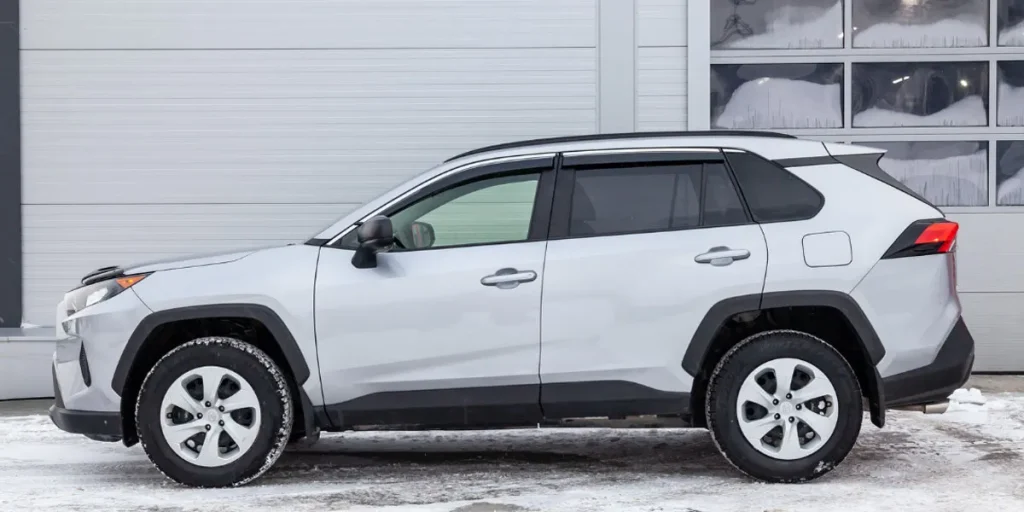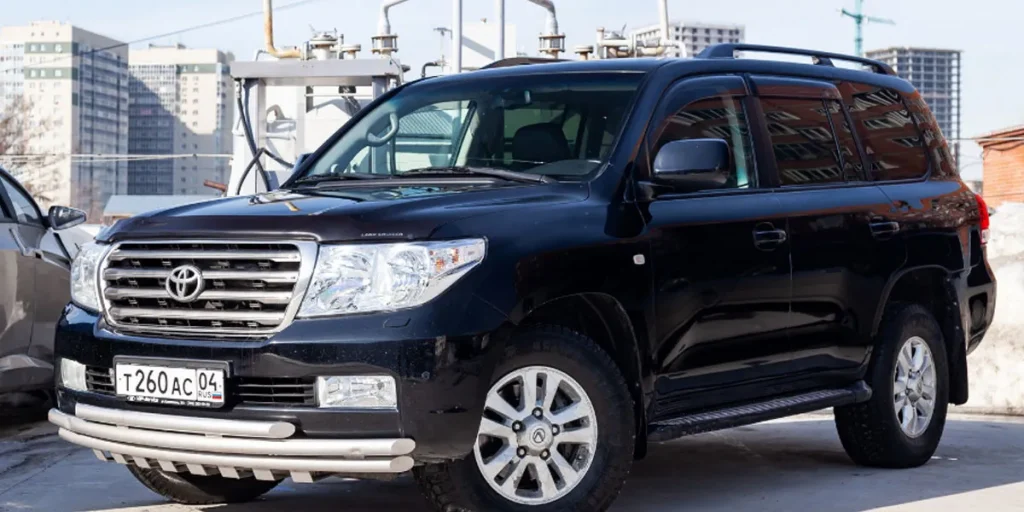A Toyota Sequoia typically weighs between 5,730 and 7,300 pounds. The exact weight depends on the model year and trim level.
The Toyota Sequoia is a full-sized SUV known for its roomy interior, robust build, and reliable performance.
Designed to accommodate families and all their gear, the Sequoia is perfect for road trips and adventurous outings. With its hefty presence, the vehicle provides a sense of safety and stability on the road.
The weight contributes to its towing capacity, enabling it to haul significant loads with ease, making it a favorite among those who need a vehicle that is both an everyday workhorse and a weekend warrior.
Enthusiasts of this model appreciate its durability and Toyota’s reputation for quality, ensuring that the Sequoia remains a popular choice for drivers seeking a balance of power and comfort in a large SUV segment.
Introducing The Mighty Toyota Sequoia
The Toyota Sequoia stands tall among full-size SUVs. Known for its rugged build and roomy interior, this vehicle proves powerful for any adventure.
Whether cruising city streets or tackling rough terrain, the Sequoia handles it all. Understanding its weight is crucial for towing and performance expectations. Let’s explore the heft of this mighty SUV.
A Glimpse At Toyota’s Full-size Suv
The Sequoia boasts ample space and durability. With a comfortable cabin, it’s perfect for large families and travel enthusiasts.
Designed for dependability, the Sequoia offers an unrivaled on-road presence. Here’s a snapshot of this SUV’s key attributes:
- Robust Engine Options
- Spacious Three-Row Seating
- Advanced Safety Features
- Potent Towing Capability
Key Factors Influencing The Sequoia’s Weight
The weight of a Toyota Sequoia can vary based on several factors. This includes the model year, trim level, and optional features.
For accurate specs, here’s a table showcasing different models and their respective weights:
| Model Year | Trim Level | Base Curb Weight |
|---|---|---|
| 2021 | SR5 | 5730 lbs |
| 2021 | Limited | 5825 lbs |
| 2021 | Platinum | 6080 lbs |
Moreover, the following elements contribute to the Sequoia’s overall weight:
- Material Selection: Use of high-strength steel and aluminum.
- Add-Ons: Additional features such as entertainment screens.
- Engine Size: Larger engines equate to heavier weights.
- 4WD vs. 2WD: Four-wheel drive systems add extra pounds.
Focusing on these factors ensures you know your Sequoia’s exact weight. This data is vital for towing safely and keeping your ride smooth.
Breaking Down The Sequoia’s Weight

Toyota Sequoias are known for their robust presence on the road. Understanding the specifics of this SUV’s weight is crucial for buyers and enthusiasts alike.
Dimensions and features can make a difference in the overall mass. Let’s explore what contributes to the Sequoia’s weight, from its base model to a fully-loaded version and how engine size factors into the equation.
Base Model Vs. Fully Loaded: A Comparison
When comparing the base model to a fully loaded Sequoia, several factors change. These changes can add to the weight of the vehicle.
The base model typically presents the lightest configuration while additional features and enhancements increase the curb weight of the Sequoia.
- Amenities like sunroofs and entertainment systems contribute additional weight.
- Upgraded trims may feature heavier materials in the interior and exterior.
- Safety features can also add to the vehicle’s mass.
A table is the best way to illustrate the potential weight differences between a base model and a fully loaded Sequoia.
| Feature | Base Model Weight | Fully Loaded Weight |
|---|---|---|
| Base Curb Weight | 5,730 lbs | N/A |
| Additional Features | N/A | + 200-500 lbs (est.) |
| Total Estimated Weight | 5,730 lbs | 5,930-6,230 lbs |
Does Engine Size Affect Weight?
The engine is the heart of any vehicle, and its size can significantly influence the overall weight.
- Bigger engines typically mean more metal, which adds to the weight.
- A heavier engine also requires stronger support structures like a robust chassis, thus increasing mass.
For the Sequoia, engine options will affect the final curb weight, but Toyota has engineered them to offer an optimal balance between performance and weight.
Variations may exist between different model years or engine types, with larger engines adding to the vehicle’s weight.
Lighter engines may lead to better fuel efficiency, but might lack the same towing capacity as their heavier counterparts.
Choosing the right engine size for your Toyota Sequoia depends on your needs. Whether you’re after fuel economy or towing power, there’s a Sequoia that fits the bill.
Model Variations And Weight Differences
The Toyota Sequoia is a full-size SUV celebrated for its durability and spacious interiors. Model variations can significantly affect its weight.
Let’s explore how different Sequoia models stack up in terms of their heft. Model Variations and Weight Differences
Comparing Different Sequoia Generations
Toyota Sequoias have evolved across different generations. Each brings new features and design changes. These factors influence the SUV’s weight.
| Generation | Year | Average Weight |
|---|---|---|
| First Generation | 2001-2007 | 5,400 lbs |
| Second Generation | 2008-2022 | 5,730 lbs |
| Third Generation | 2023-present | 5,600 lbs |
Different trim levels and options also affect the weight within each generation.
Special Editions And Their Impact On Weight
Special editions often come with extra features. These features can add to the overall weight of the Sequoia.
- Limited Edition models may include heavier luxury materials.
- Off-Road packages add weight with their rugged enhancements.
- The TRD Pro version, designed for performance, adds specialized equipment.
Each special edition targets different needs, altering the Sequoia’s weight.
Understanding Weight Classifications

The weight of a vehicle not only impacts its performance but also defines its classification.
Toyota Sequoia, a sizable SUV, falls into a weight class that balances functionality and maneuverability.
Knowing where this robust vehicle stands in terms of weight is crucial for various reasons.
Where The Sequoia Fits Within Vehicle Classes?
Typically, cars are categorized into classes such as compact, midsize, or full-size. Sequoia is a full-size SUV.
This classification means it’s bigger and often heavier than midsize SUVs. It has more space for passengers and cargo.
This implies a different set of expectations for performance and efficiency.
Implications Of The Sequoia’s Weight On Performance
The weight of the Sequoia influences several aspects of its performance. Heavier vehicles like the Sequoia require powerful engines.
This ensures they can accelerate effectively and manage steep inclines.
- Towing Capacity: A heavier build enhances towing capabilities.
- Fuel Economy: More weight can lead to higher fuel consumption.
- Ride Quality: Weight impacts stability and comfort on the road.
Real-world Considerations
When selecting a vehicle like the Toyota Sequoia, it’s important to understand its weight.
This not only influences driving dynamics. But, it also affects efficiency, and cost of ownership.
In real-world scenarios, the Sequoia’s weight can impact everything from fuel economy to towing capabilities.
Fuel Economy And Weight Correlation
The Toyota Sequoia’s weight plays a vital role in its fuel economy. Heavier
vehicles often use more fuel.
Therefore, knowing the exact weight of the Sequoia is key for budgeting fuel costs. Let’s compare weights and their effect on fuel consumption.
- Heavier weight leads to more fuel used
- Aerodynamics become less efficient
- Greater mass requires more energy to move
Navigating Weight Restrictions And Towing Capacity
Understanding the Sequoia’s weight is also crucial for towing. Compliance with weight restrictions on roads and bridges ensures safety.
Here’s what to know about your Sequoia’s towing limits:
- Check the vehicle’s Gross Vehicle Weight Rating (GVWR)
- Ensure adherence to local weight restrictions
- Maximize towing capacity without compromising safety
FAQ About the Weight of a Toyota Sequoia
What Is The Curb Weight Of A Toyota Sequoia?
The curb weight of a Toyota Sequoia can vary depending on the model year and trim. Generally, it ranges from approximately 5,600 to 6,000 pounds.
How Does Sequoia’s Weight Compare To Similar Suvs?
The Toyota Sequoia is comparable in weight to other full-size SUVs. It’s typically heavier than mid-size SUVs and lighter than some of the largest models on the market.
Does Sequoia’s Weight Affect Fuel Efficiency?
Yes, the weight of the Toyota Sequoia does impact fuel efficiency.
Heavier vehicles like the Sequoia tend to consume more fuel than lighter ones, particularly in city driving.
Can Weight Influence The Towing Capacity Of Sequoia?
Absolutely. A heavier vehicle like the Sequoia often has a higher towing capacity.
However, the specific towing limit depends on the engine and other equipment.
Conclusion
Understanding the weight of your Toyota Sequoia is essential, especially for towing and payload capacities. The exact figure varies depending on the model year and trim.
Whether for performance evaluation or legal compliance, keep these specifications in hand. Make informed choices and enjoy the robust capabilities of your Sequoia.
Resources:
https://www.toyota.com/sequoia/
https://www.fueleconomy.gov/feg/Find.do?action=sbs&id=47212
